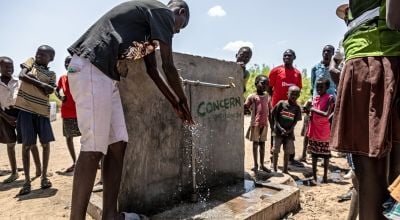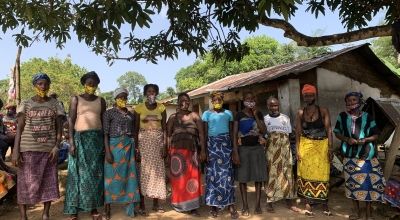
Read our 2024 annual report

Knowledge Hub
Six months on since fighting broke out in Sudan, our staff members recall their experiences of those shocking first few weeks and describe the devastating impact the conflict has wrought on an already suffering population.
"You couldn’t go far away. Someone might be looting you, or stopping you on your way, because people have guns everywhere.”
These are the words of Concern staff member Hamdoon Ismail Abdalla, a health and nutrition officer for Concern Sudan who has been working on the ground during six months of conflict between rival factions - worsening an already existing humanitarian crisis in the country.
Prior to April 15 2023, when fighting broke out, Sudan was a country already in turmoil. Concern has been working there for over 38 years, and many of those years have been marred by conflict. When fighting erupted once more in April, we were forced to suspend our work, with our 140 Sudanese staff sheltering in their homes or in safer areas.
Hamdoon, who was living in Al Geneina when the conflict broke out, explains: “We stayed at home. We didn’t go out for one month. You could go early to buy something and then return back home.”
Working through conflict
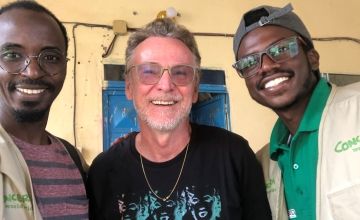
Hamdoon tried to work from home, but this was extremely difficult as his internet connection was cut, and he was unable to make phone calls. In mid-May, he made the decision to travel to Chad with his father and grandmother. “We took the decision to go there because there was nothing at home. The market was not working, we could not buy anything to eat. It was difficult, because there was no transportation, no vehicles. We were searching and asking people if they had a car going to Adré. Eventually we got a car to drive to Adré. The rest of the family was in Khartoum. We couldn’t even contact them, so they knew nothing about us in Al Geneina at that time.”
Hamdoon is just one of millions of people in Sudan who had no choice but to flee and leave everything behind them. An average of 1 million people have been displaced every month since fighting began. That’s almost 6 million people in six months.
Someone might be looting you, or stopping you on your way, because people have guns everywhere
For those who have been forced to flee, 4.3 million people have become displaced within Sudan and 1.1 million have sought refuge in Chad, Central African Republic, Egypt, Ethiopia and South Sudan. According to UNICEF, over 24 million people are now in need of humanitarian assistance, including nearly 14 million children.
When he arrived in Chad, Hamdoon and his family went to stay with his aunt and nephew, who lived there already. He says that the security there is stable, but that the journey across the border was difficult, due to armed groups “every 3 km” demanding money to allow them to continue their journey.
Separation from families
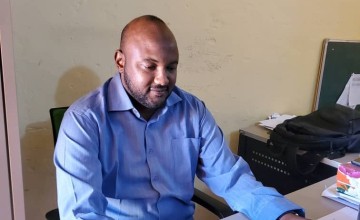
Thanks to the dedication of staff members like Hamdoon, we were thankfully able to resume our work within a matter of weeks, to support those affected within Sudan and across the border. However, many of our staff are still dealing with the difficulty of being forced to uproot their lives, and of being separated from their families.
Ahmed Yassin Mohamed Babiker is a Concern health and nutrition officer in West Darfur, who has been working in Kulbus since before the conflict. However, he is from Al Geneina, and has not been able to reunite with his family members in the past six months.
“I have not been back to my home since the start of the conflict,” he said. “Our family home in Al Geneina town has been looted. My family members have left their home, and have been displaced, some to other places in Al Geneina, some closer to the Chad border. Everything has been lost.”
Poor telecommunications meant that at the beginning of the crisis, Ahmed struggled to even speak to his family, although now, he explained they can reach each other via WhatsApp and Messenger through the Chadian network.
Ongoing health, safety and security risks
Our staff are witnessing the needs of the communities around them, as well as the dangers they face, on a daily basis. Ahmed explained: “In Al Geneina, there is very restricted movement because of the conflict and difficulty to collect water because the water sources have been completely stopped. They must go to the river to collect water in jerry cans. But the situation is insecure and there are some people in high buildings that are shooting people.
“Here in Kulbus, we face rising prices for food items. Our payments have been increased to collect some food items from the market. All items, food and non-food, are imported from Chad due to the closure of roads between Kulbus, Al Geneina and Khartoum, and the exchange rate for the Chadian currency is fluctuating. That affects the price of all items, even renting vehicles.”
The situation is insecure and there are some people in high buildings that are shooting people.
Massive humanitarian needs
Due to prices for available produce rocketing and a general lack of food, levels of hunger and malnutrition are rapidly increasing. The Integrated Food Security Phase Classification (IPC) warned in August that 20.3 million people (over 42 per cent of its population) have been driven into high levels of acute food insecurity, while 6.3 million people are living in IPC Phase 4 - one level below famine. With displacement of this scale also comes the spread of disease, as Sudanese people struggle to find food or clean water. Gedaref, for example, has experienced an outbreak of cholera and acute watery diarrhea.
Hamood is seeing these issues affecting Sudanese refugees in Chad, many of whom have been separated from family members and have witnessed horrific violence on their journey. He said: “There is not enough water for them, not enough food, there is no shelter. People who arrived early were provided with shelter, but there is not enough. Most of them are women and children. You can find some men but not that much; they are killing men more than women and children. There are families who have been split from fathers, brothers, husbands. It is difficult to get in contact. They have no phone numbers, they came here empty-handed. In Adré, people need shelter, water and more food.”
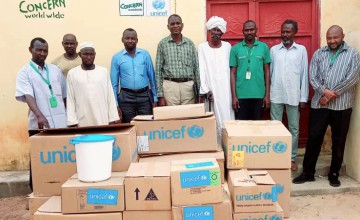
Our work on the ground
Staff members like Ahmed and Hamood are not only dealing with the personal effects of the conflict, but are facing difficulties in their work - from communication channels being disrupted, to a lack of vehicles, to difficulty in transporting and receiving supplies, to health clinics being looted. However, they are committed to carrying out Concern’s work and supporting Sudanese communities in this great time of need.
Hamood told us that his team is working on providing WASH services for refugees in Adré, to support other organisations working there. Ahmed continues to coordinate the health and nutrition projects in the localities he works in, where it is deemed safe to do so.
Meanwhile, in September, a joint aid mission between Concern and UNICEF delivered nine tonnes of medical supplies to 10 health facilities in the Kulbus and Jebel Moon areas of West Darfur, marking the first shipment of medical supplies since the conflict began. The supplies included sterilised equipment for midwives delivering babies, first aid kits, medicines, vitamins, water purification tablets, equipment for treating malnourished children and test kits for acute watery diarrhoea.
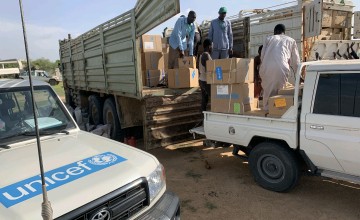
Concern Sudan’s systems director Louise Foster called the medical supplies “a ray of light”, and added: “The health facilities we reached had no new supplies since the fighting started on April 15. Many were out of stock of many essential medicines and items needed to treat malnutrition. People fleeing conflict in other parts of the region were arriving at these health facilities so this aid is crucial to ensure basic primary healthcare including the safe delivery of children.”
A bigger international response is needed
Unfortunately, much of the need facing the Sudanese remains unaddressed. The humanitarian response in Sudan is underfunded, with about 33% of the $842.5 million needed having been received. Martin Griffiths, Under-Secretary-General for Humanitarian Affairs and Emergency Relief Coordinator for UN OCHA, told the BBC: “It’s very, very difficult to get media attention to Sudan and yet I believe Sudan is the place in the world where we as the humanitarian community is failing more than elsewhere to reach people in need.”
The humanitarian needs of the Sudanese mount, and will continue to do so for as long as the conflict goes on. It is crucial that the international community meets the funding needs, and that we do not forget Sudan.



